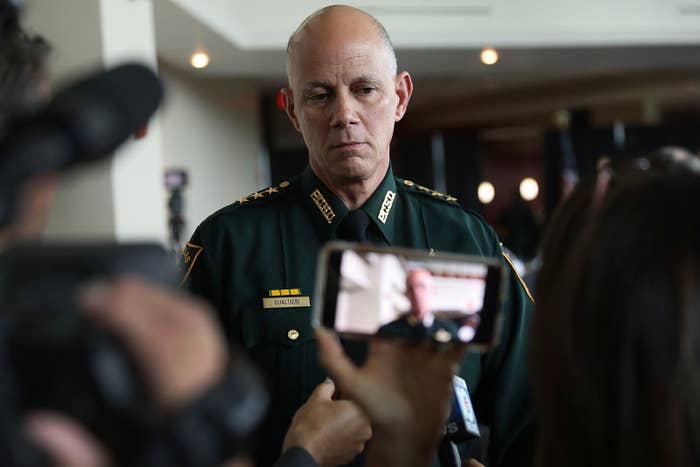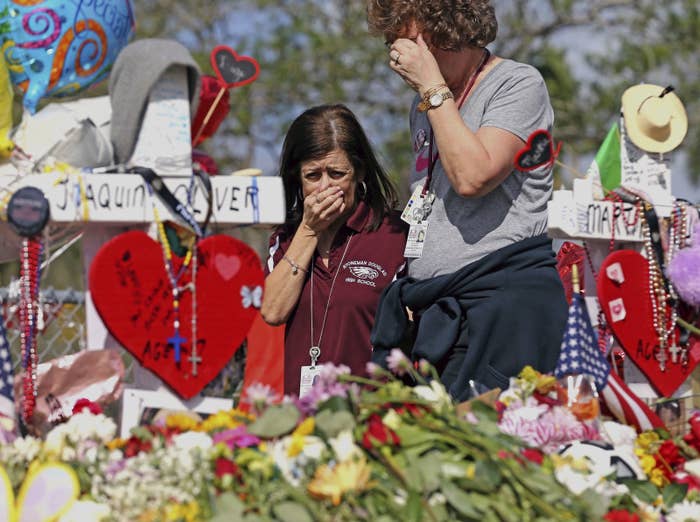
The mother of suspected Florida school shooter Nikolas Cruz repeatedly interfered with efforts to help her son get mental health treatment and allowed him to buy guns, despite warnings from counselors, investigators said Tuesday.
During a lengthy meeting about the 19-year-old's involvement in behavioral programs, the chair of the Marjory Stoneman Douglas High School Public Safety Commission said that Lynda Cruz enabled her son's concerning and volatile behavior and pushed back on concerns that he should not own a firearm.
"There are a whole, whole lot of people who tried very hard to have an impact on Cruz and to change him and his behavior," Pinellas County Sheriff Bob Gualtieri, who heads the commission, told members Tuesday afternoon. "It wasn't being effective and some of it was because of his mother."
Cruz was charged with 17 counts of premeditated murder and 17 counts of attempted murder after he confessed to gunning down his former classmates and teachers in Parkland, Florida.
Before she died of pneumonia last November, Lynda Cruz interfered with ongoing efforts to help her son, who has a range of mental health and behavioral issues, Gualtieri said.
"His mother was an enabler," he said. "His mother contributed to this significantly to the point that at one time he said he wanted a gun and counselors at schools said he shouldn't have a gun and his mother said if he wants a gun he can have a gun."
About a year before the shooting, Cruz, then 18, was living with his mother and brother when he legally purchased an AR-15 rifle, which authorities say he used to kill students and teachers on Valentine's Day. He also had purchased other weapons and ammunition before and after she died, records show, despite countless 911 calls from his mother about her son's violent behavior and dozens of visits from the Henderson Behavioral Health clinic.
According to Gualtieri, Henderson counselors had at least 140 contacts with the shooter, often spending "two-plus hours" at a time at his home "multiple times a week."
"There were school counselors spending hours with him," the sheriff went on. "There was a whole bunch of effort being made but it just didn't get it there."
Cruz had been exhibiting a pattern of concerning behaviors that had been escalating since he was young, causing him to act out at home and at school.
Years before he confessed to the deadliest school shooting in Florida history, Cruz told a school therapist about his violent dreams, obsession with guns, and desire to hurt people, according to his psychiatric file. Therapists made notes that they had shared "concerns with parent about his obsession with guns/military and his poor anger control."
They also advised his mother "to restrict access to any weapon."
Sheriff's logs document a litany of incidents in which Cruz and his younger brother frequently broke furniture at home and attacked their mother. In 2016, Cruz posted a video on Snapchat showing him cutting himself, prompting a visit from the Florida Department of Children and Families. The investigator noted that the depressed teenager was on medication and told his mother that he was going to buy a gun, though she didn't know why.

The revelations came during the first day of a three-day deliberation delving into what contributed to and enabled the mass shooting, which sparked a nationwide, youth-led movement demanding action on school violence, and what should be done to prevent another rampage.
Max Schachter, a commission member who lost his son, Alex, in the shooting, called the meetings "helpful and upsetting."
"I am glad we are learning about all this stuff now," the father told BuzzFeed News, referring to behavioral threat assessments and programs. "But it's depressing and upsetting that we didn't have what [other states] did and do. We are so far behind in how kids can report other violent kids. How do you expect to prevent these acts and horrible things from happening if students don't have an easy way to report them?"
But even if students flag peers who they believe could be a threat — as some Parkland teens did — those concerns could be futile if adults fail to take action.
"All these programs are predicated on officials doing their jobs and parents taking advice from the school district," Schachter said. "But if parents are enablers and others aren't paying attention, it's nearly impossible to stop."
